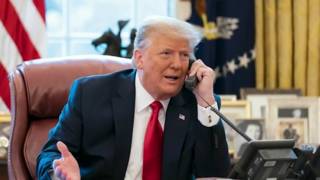
In its seventh public hearing, the House Select Committee to Investigate the January 6th Attack on the U.S. Capitol presented evidence and witness testimony that revealed how then-President Trump was a driving force behind assembling a violent mob that would target the Capitol. While Trump’s own Cabinet members and legal advisers found no evidence of voter fraud and advised him to concede the election, he continued to tweet messages to followers that painted the election as stolen. “President Trump is a 76-year-old man; he is not an impressionable child. Just like everyone else in our country, he is responsible for his own actions and his own choices. As our investigation has shown, Donald Trump had access to more detailed and specific information showing that the election was not actually stolen than almost any other American, and he was told this over and over again,” said committee vice chair, Republican Congresswoman Liz Cheney in her opening remarks. “No rational or sane man in his position could disregard that information and reach the opposite conclusion. And Donald Trump cannot escape responsibility by being willfully blind.”
Transcript
AMY GOODMAN: The U.S. House Select Committee to Investigate the January 6th Attack on the United States Capitol revealed stark new details at its seventh public hearing Tuesday focusing on evidence that shows the connections between former President Donald Trump and extremist groups that carried out the deadly assault. The committee also heard live testimony from a former spokesperson for the Oath Keepers and from a man who said he participated in the riot at the Capitol because Trump told supporters to go there. In a dramatic scene after the hearing, the rioter, Stephen Ayres, shook hands and apologized to officers who defended the Capitol. Some of the newest evidence presented Tuesday came from the deposition of former White House counsel Pat Cipollone, which just happened on Friday.
Today we’ll bring you highlights from the hearing. This is committee vice chair Republican Congresswoman Liz Cheney in her opening remarks.
REP. LIZ CHENEY: Our committee did not conduct a hearing last week, but we did conduct an on-the-record interview of President Trump’s former White House counsel, Pat Cipollone. If you’ve watched these hearings, you’ve heard us call for Mr. Cipollone to come forward to testify. He did, and Mr. Cipollone’s testimony met our expectations.
We will save for our next hearing President Trump’s behavior during the violence of January 6th. Today’s hearing will take us from December 14th, 2020, when the Electoral College met and certified the results of the 2020 presidential election, up through the morning of January 6th. You will see certain segments of Pat Cipollone’s testimony today. We will also see today how President Trump summoned a mob to Washington and how the president’s stolen election lies provoked that mob to attack the Capitol. And we will hear from a man who was induced by President Trump’s lies to come to Washington and join the mob and how that decision has changed his life.
Today’s hearing is our seventh. We have covered significant ground over the past several weeks, and we have also seen a change in how witnesses and lawyers in the Trump orbit approach this committee. Initially, their strategy, in some cases, appeared to be to deny and delay. Today there appears to be a general recognition that the committee has established key facts, including that virtually everyone close to President Trump — his Justice Department officials, his White House advisers, his White House counsel, his campaign — all told him the 2020 election was not stolen.
This appears to have changed the strategy for defending Donald Trump. Now the argument seems to be that President Trump was manipulated by others outside the administration, that he was persuaded to ignore his closest advisers and that he was incapable of telling right from wrong. This new strategy is to try to blame only John Eastman or Sidney Powell or Congressman Scott Perry or others, and not President Trump. In this version, the president was, quote, “poorly served” by these outside advisers. The strategy is to blame people his advisers called, quote, “the crazies” for what Donald Trump did. This, of course, is nonsense. President Trump is a 76-year-old man; he is not an impressionable child. Just like everyone else in our country, he is responsible for his own actions and his own choices.
As our investigation has shown, Donald Trump had access to more detailed and specific information showing that the election was not actually stolen than almost any other American, and he was told this over and over again. No rational or sane man in his position could disregard that information and reach the opposite conclusion. And Donald Trump cannot escape responsibility by being willfully blind, nor can any argument of any kind excuse President Trump’s behavior during the violent attack on January 6th.
As you watch our hearing today, I would urge you to keep your eye on two specific points. First, you will see evidence that Trump’s legal team, led by Rudy Giuliani, knew that they lacked actual evidence of widespread fraud sufficient to prove that the election was actually stolen. They knew it, but they went ahead with January 6th anyway.
And second, consider how millions of Americans were persuaded to believe what Donald Trump’s closest advisers in his administration did not. These Americans did not have access to the truth like Donald Trump did. They put their faith and their trust in Donald Trump. They wanted to believe in him. They wanted to fight for their country. And he deceived them. For millions of Americans, that may be painful to accept, but it is true.
AMY GOODMAN: Those were the opening remarks from Republican Congresswoman Liz Cheney, vice chair of the House Select Committee to Investigate the January 6th Attack on the U.S. Capitol, at the seventh public hearing Tuesday. Stay with us.













Media Options